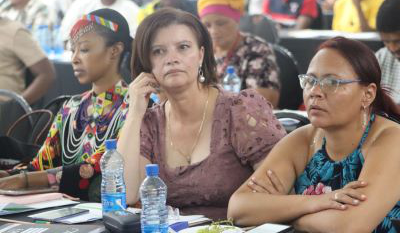A Platfom For Artists
By: Siphiwe Ngcongco
The Northern Cape Department of Sport, Arts and Culture (DSAC) hosted the inaugural provincial arts indaba at the Horseshoe Inn last week in Kimberley to identify challenges and resolve issues such as policy and advocacy, funding, skills development and training including community art centres.
Hundred and fifty delegates came together from five districts accompanied by MEC of Sport, Arts and Culture Desery Fienies.
Delegates formed three commissions focusing on; the white paper on arts and culture, networking/federations and capacity building.
Thami Sikhupelo, the former chairperson of Kapa Bokone, a forum that advocates for Community Arts Centres, led the networking commission. The commission proposed a need to revive Kapa Bokone to hold the regional and provincial structures together.
They also suggested that a provincial task team (PTT) must be established by 1 April this year, consisting of district representatives, in preparation for the national conference.
Phemelo Sediti, Northern Cape theatre manager, explained that the white paper on arts and culture was a document raising challenges in the arts and how they can be resolved. It also touches on building a relationship with relevant stakeholders.
Sediti said, “the issue of reviewing the white paper was to address matters around transformation in the cultural and creative industries going back two decades. Today’s generation has a talent which needed refining
,” he emphisised.
“MEC or head of the department of DSAC must sign a memorandum of understanding (MOU) with the department of Cooperative Governance, Human Settlements and Traditional Affairs (COGHSTA), dictating that CACs use deserted buildings
.
Gender-Based Violence (GBV) activist, Sindisa Qeqe represented the capacity building commission. She said talented youth were dying due to no opportunities or platforms for their specialties, blaming the lack of recognition caused by nepotism and exploitation. “We do not have female directors in the sector. There is a shortage of exchange programmes within the arts industry,” decried Qede.
Qeqe added that the department gives established artists opportunities and pays them thousands of rands.
The National Arts Council director, Charles
Mayema, stressed the need to revive Kapa Bokone. “It is vital to form partnerships with local municipalities to ensure they accommodate arts and culture activities by being part of their Integrated Development Plan (IDP).
Training at least 60% of artistic women directors in theatre is necessary. Accreditation for theatre teachers is needed and the Sector Education and Training Authority (SETA) must to be on board”.
Provincial Cultural & Creative Industries Federation of South Africa (CCIFSA) chairperson, Tshepang Makhetha said the culture and creative industry still needed financial assistance and strong advocacy for struggling artists. He warned board members not to use their organisations as vehicles to exploit artists and use them for their personal enrichment. They must treat artists respectfully and help them grow within their centres.
Fienies responded that the department had a limited budget which placed constraints on service delivery. She announced that the department is in the process of empowering and recognising community arts centres by addressing challenges within the field.
“In the wake of our dismal economic situation, we must be more innovative in our businesses. If funds are too limited to financially support the cultural and creative sector, we need to go the extra mile in creating an environment for local artists to flourish,” she said.


Comments are closed.